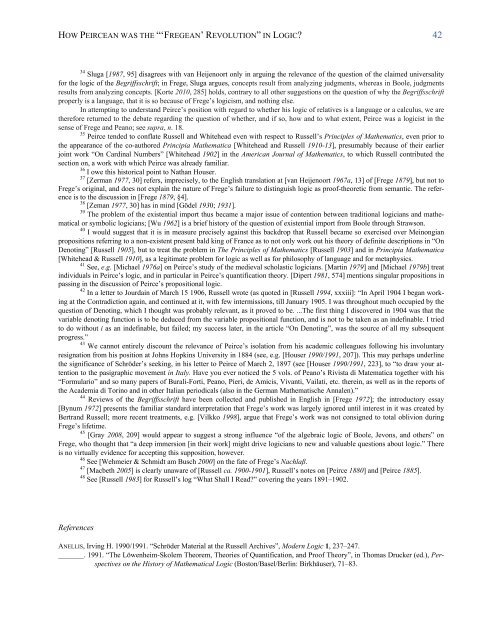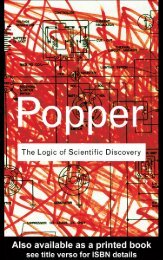Create successful ePaper yourself
Turn your PDF publications into a flip-book with our unique Google optimized e-Paper software.
HOW PEIRCEAN WAS THE “‘FREGEAN’ REVOLUTION” IN LOGIC? 42<br />
34 Sluga [1987, 95] disagrees with van Heijenoort only in arguing the relevance of the question of the claimed universality<br />
for the logic of the Begriffsschrift; in Frege, Sluga argues, concepts result from analyzing judgments, whereas in Boole, judgments<br />
results from analyzing concepts. [Korte 2010, 285] holds, contrary to all other suggestions on the question of why the Begriffsschrift<br />
properly is a language, that it is so because of Frege’s logicism, and nothing else.<br />
In attempting to understand Peirce’s position with regard to whether his logic of relatives is a language or a calculus, we are<br />
therefore returned to the debate regarding the question of whether, and if so, how and to what extent, Peirce was a logicist in the<br />
sense of Frege and Peano; see supra, n. 18.<br />
35 Peirce tended to conflate Russell and Whitehead even with respect to Russell’s Principles of Mathematics, even prior to<br />
the appearance of the co-authored Principia Mathematica [Whitehead and Russell 1910-13], presumably because of their earlier<br />
joint work “On Cardinal Numbers” [Whitehead 1902] in the American Journal of Mathematics, to which Russell contributed the<br />
section on, a work with which Peirce was already familiar.<br />
36 I owe this historical point to Nathan Houser.<br />
37 [Zerman 1977, 30] refers, imprecisely, to the English translation at [van Heijenoort 1967a, 13] of [Frege 1879], but not to<br />
Frege’s original, and does not explain the nature of Frege’s failure to distinguish logic as proof-theoretic from semantic. The reference<br />
is to the discussion in [Frege 1879, §4].<br />
38 [Zeman 1977, 30] has in mind [Gödel 1930; 1931].<br />
39 The problem of the existential import thus became a major issue of contention between traditional logicians and mathematical<br />
or symbolic logicians; [Wu 1962] is a brief history of the question of existential import from Boole through Strawson.<br />
40 I would suggest that it is in measure precisely against this backdrop that Russell became so exercised over Meinongian<br />
propositions referring to a non-existent present bald king of France as to not only work out his theory of definite descriptions in “On<br />
Denoting” [Russell 1905], but to treat the problem in The Principles of Mathematics [Russell 1903] and in Principia Mathematica<br />
[Whitehead & Russell 1910], as a legitimate problem for logic as well as for philosophy of language and for metaphysics.<br />
41 See, e.g. [Michael 1976a] on Peirce’s study of the medieval scholastic logicians. [Martin 1979] and [Michael 1979b] treat<br />
individuals in Peirce’s logic, and in particular in Peirce’s quantification theory. [Dipert 1981, 574] mentions singular propositions in<br />
passing in the discussion of Peirce’s propositional logic.<br />
42 In a letter to Jourdain of March 15 1906, Russell wrote (as quoted in [Russell 1994, xxxiii]: “In April 1904 I began working<br />
at the Contradiction again, and continued at it, with few intermissions, till January 1905. I was throughout much occupied by the<br />
question of Denoting, which I thought was probably relevant, as it proved to be. ...The first thing I discovered in 1904 was that the<br />
variable denoting function is to be deduced from the variable propositional function, and is not to be taken as an indefinable. I tried<br />
to do without i as an indefinable, but failed; my success later, in the article “On Denoting”, was the source of all my subsequent<br />
progress.”<br />
43 We cannot entirely discount the relevance of Peirce’s isolation from his academic colleagues following his involuntary<br />
resignation from his position at Johns Hopkins University in 1884 (see, e.g. [Houser 1990/1991, 207]). This may perhaps underline<br />
the significance of Schröder’s seeking, in his letter to Peirce of March 2, 1897 (see [Houser 1990/1991, 223], to “to draw your attention<br />
to the pasigraphic movement in Italy. Have you ever noticed the 5 vols. of Peano’s Rivista di Matematica together with his<br />
“Formulario” and so many papers of Burali-Forti, Peano, Pieri, de Amicis, Vivanti, Vailati, etc. therein, as well as in the reports of<br />
the Academia di Torino and in other Italian periodicals (also in the German Mathematische Annalen).”<br />
44 Reviews of the Begriffsschrift have been collected and published in English in [Frege 1972]; the introductory essay<br />
[Bynum 1972] presents the familiar standard interpretation that Frege’s work was largely ignored until interest in it was created by<br />
Bertrand Russell; more recent treatments, e.g. [Vilkko 1998], argue that Frege’s work was not consigned to total oblivion during<br />
Frege’s lifetime.<br />
45 [Gray 2008, 209] would appear to suggest a strong influence “of the algebraic logic of Boole, Jevons, and others” on<br />
Frege, who thought that “a deep immersion [in their work] might drive logicians to new and valuable questions about logic.” There<br />
is no virtually evidence for accepting this supposition, however.<br />
46 See [Wehmeier & Schmidt am Busch 2000] on the fate of Frege’s Nachlaβ.<br />
47 [Macbeth 2005] is clearly unaware of [Russell ca. 1900-1901], Russell’s notes on [Peirce 1880] and [Peirce 1885].<br />
48 See [Russell 1983] for Russell’s log “What Shall I Read?” covering the years 1891–1902.<br />
References<br />
ANELLIS, Irving H. 1990/1991. “Schröder Material at the Russell Archives”, Modern Logic 1, 237–247.<br />
_______. 1991. “The Löwenheim-Skolem Theorem, Theories of Quantification, and Proof Theory”, in Thomas Drucker (ed.), Perspectives<br />
on the History of Mathematical Logic (Boston/Basel/Berlin: Birkhäuser), 71–83.





